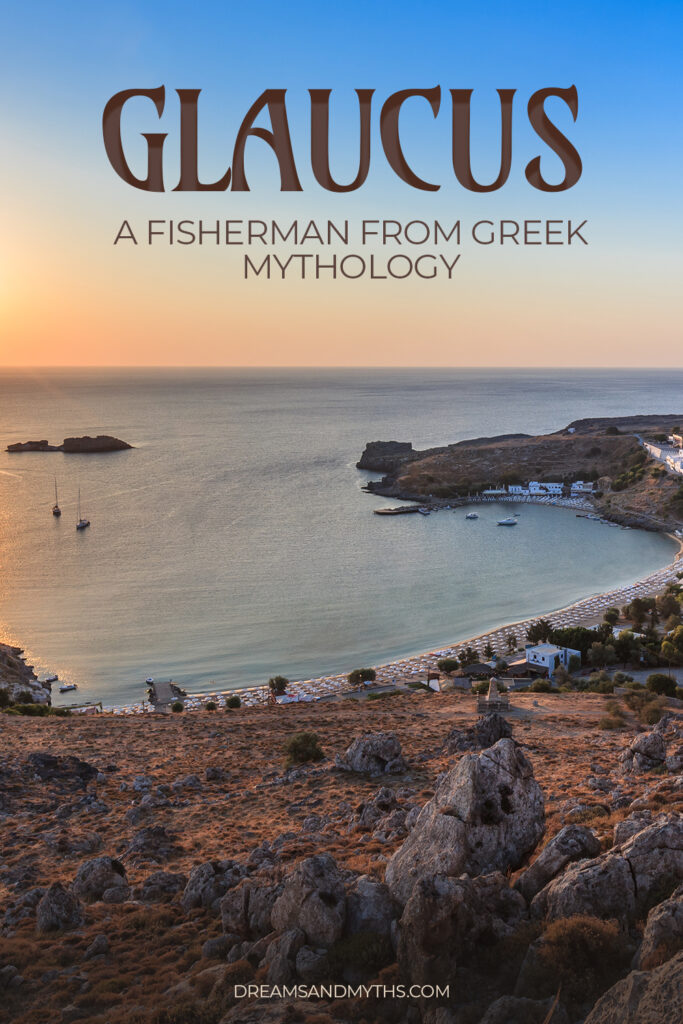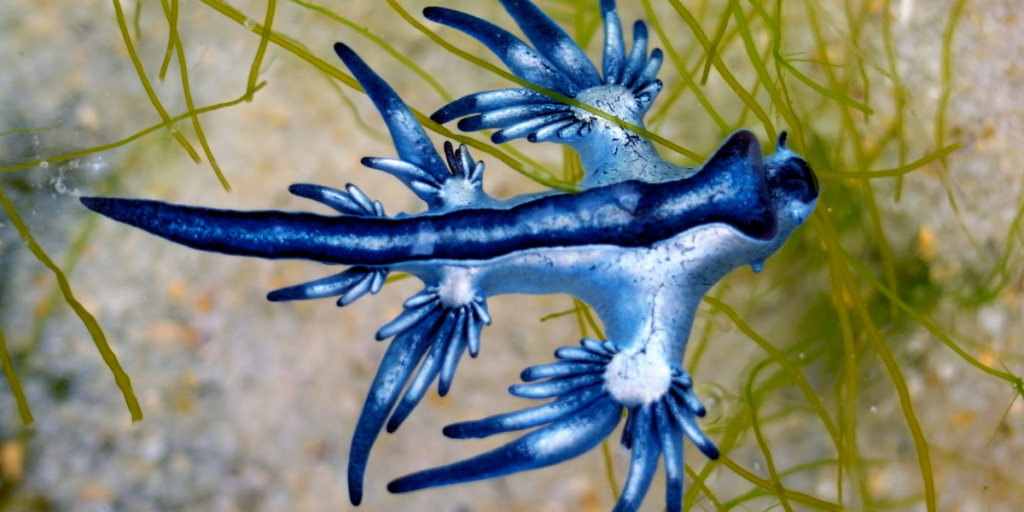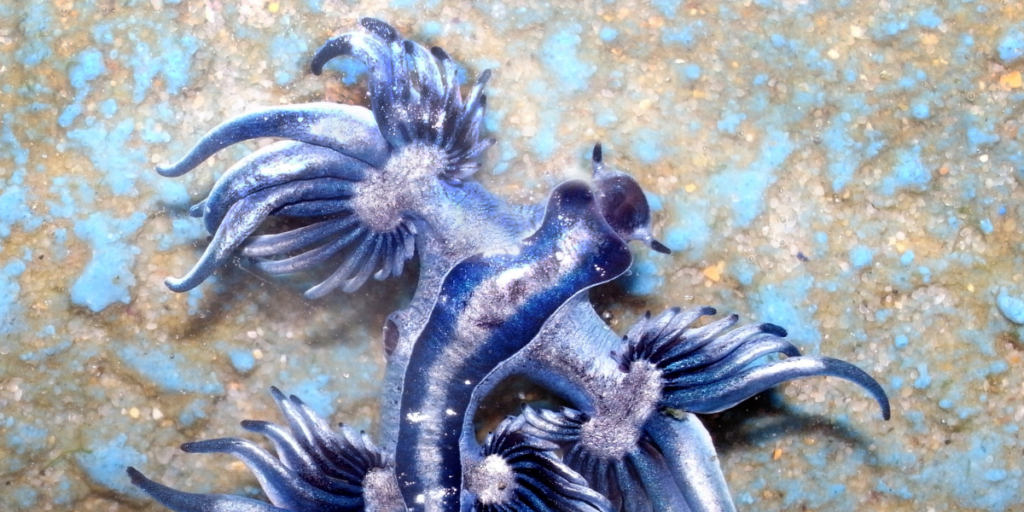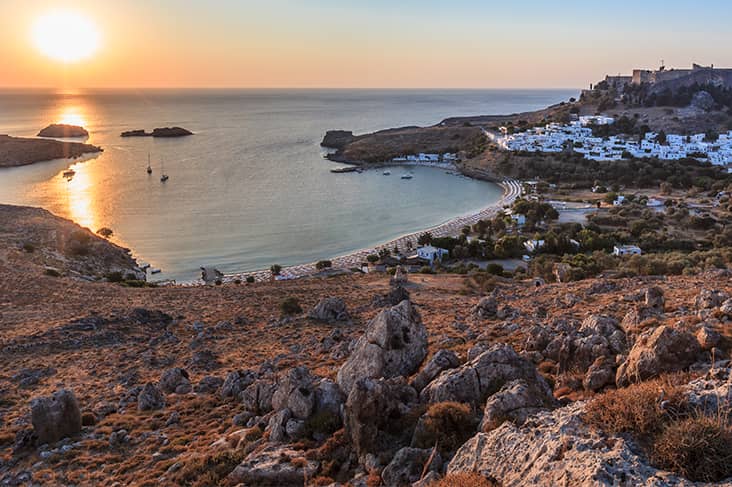Greek mythology is a large and varied body of work that has been a part of the Western world for thousands of years. It tells stories of gods and mortals, heroes and villains, love, and war.
One of the figures featured in Greek mythology is Glaucus, a fisherman who becomes a sea god. Glaucus is an enigmatic figure from Greek mythology who has captivated people’s imaginations for centuries.
He was best known for his role as a sea god and messenger of the sea. According to legend, Glaucus was the son of the god of the sea, Poseidon, and the nymph Leucothea. He was known for his exceptional strength and bravery and was often depicted as a powerful and majestic figure.

According to many other myths, the gods called Glaucus to work for them, either as a messenger or a protector of the sea. One day, Glaucus encountered the sea god Poseidon while out on the water.
He was given an extraordinary gift by the sea god Poseidon, which allowed him to speak with and understand the language of sea creatures. He then used this newfound power to help his people, eventually becoming a great hero. He was revered as a symbol of power and beauty in the seas and oceans and depicted as a guardian of sailors and ships.
In this article, we will discuss Glaucus’s story and how his presence still influences today’s world.
Early Life of Glaucus

Glaucus was born in Anthedon, an ancient Greek city. His early life is not well known, but it is said that he was a skilled and hardworking fisherman who spent much of his time out at sea. He was raised in the ocean depths, and from a young age, he displayed extraordinary strength and bravery.
His father was the king of the Anthedon, his mother was a nymph, and he had three sisters and a brother.
Later, as he grew up, he started living in the ancient city of Corinth, where he worked as a fisherman on the shore of a sea. He was known for his love of the sea and spent much time exploring the ocean’s depths and protecting the living creatures there.
Glaucus was also highly intelligent and possessed great wisdom and insight.
As he grew older, Glaucus became increasingly powerful, and his reputation as a sea god began to spread. The gods often called upon him to do their bidding as a messenger or a protector of the sea. He was also revered as a symbol of the power and beauty of the ocean and was often depicted as a guardian of sailors and ships.
Despite his fearsome reputation, Glaucus was also known to be kind and generous and often depicted as a benevolent and wise god who helped those in need.
Glaucus was a complex and multifaceted figure, and his early life was marked by his many adventures and encounters with the gods and other mythical creatures. As a young man, Glaucus was known for his exceptional strength and athleticism and was often chosen to participate in important athletic contests and battles. He was also a skilled sailor and navigator and was often called upon to guide ships and protect sailors at sea.
How Glaucus Became a Fisherman And Transformed Into a Sea God?
There is no mention in Greek mythology of Glaucus being a fisherman before his transformation into a sea god. Glaucus became a fisherman after he was transformed by the god Dionysus.
The story goes that Glaucus was once a mortal man who lived near the sea and spent his days fishing. One day, while out on the water, he caught a fish that was sacred to Dionysus. The god was enraged and punished Glaucus by turning him into a sea god and granting him great powers and immortality. From that day on, Glaucus lived in the ocean, using his powers to protect sailors and ships from danger.
As a young man, Glaucus was known for his exceptional strength and athleticism and was often chosen to participate in important athletic contests and battles. He was also a skilled sailor and navigator and was often called upon to guide ships and protect sailors at sea.
During his encounter with Poseidon, Glaucus was transformed into a sea god. It is said that Poseidon was so impressed with Glaucus’ bravery and determination that he granted him powers and abilities beyond those of a mortal.
Some versions of the myth suggest that Glaucus could breathe underwater and communicate with sea creatures, while others say that he was given the power to control the tides and the winds.
Overall, Glaucus’s transformation into a sea god was seen as a punishment but also as a blessing, as it granted him powers and abilities that he could use to help others. From that point on, Glaucus was revered as a sea god and played a significant role in shaping the mythology of the sea and marine life.
Meeting With Scylla
Glaucus met Scylla, a sea monster, while on a fishing trip. Scylla was a fierce and terrifying creature known for her voracious appetite and her ability to transform into a dragon-like monster with six heads. Glaucus was intrigued by Scylla’s power and beauty and decided to approach her.
However, as he drew near, Scylla became frightened and attacked him, biting off one of his arms. Glaucus was devastated by the attack and vowed to get revenge on Scylla.
Glaucus And Ariadne
One of the most famous myths involving Glaucus is the legend of Glaucus and Ariadne. According to the myth, Glaucus was in love with Ariadne, the daughter of the Cretan king, Minos.
However, Ariadne was already engaged to another man, the Athenian hero Theseus. Despite this, Glaucus pursued Ariadne, and eventually, she agreed to elope with him. The two fled to the island of Naxos, where they lived happily together.
Glaucus’ Role in Greek Mythology
In addition to his stories with Ariadne and Scylla, Glaucus also played a role in other myths and legends of ancient Greece. In some stories, he was depicted as a wise and noble sea god, whereas in others, he was portrayed as a trickster or a bringer of chaos. Glaucus was known to have close relationships with other gods and mortals, and he often intervened in their lives to offer guidance or assistance.
Glaucus’ Later Life

Glaucus was also highly intelligent and was said to possess great wisdom and insight.
As he grew older, Glaucus became more and more powerful, and his reputation as a sea god began to grow. The gods often called upon him to do their bidding as a messenger or a protector of the sea. He was also revered as a symbol of the power and beauty of the ocean and was often depicted as a guardian of sailors and ships.
What Lessons Can we Learn From Glaucus’s Life?
Glaucus, the fisherman from Greek mythology, is an important figure in ancient literature. He was an ordinary man who made a powerful journey to immortality. His story can teach us a few valuable lessons.
Firstly, Glaucus reminds us that we should never underestimate our power and potential. He proves that anyone can achieve greatness, regardless of background or social status. Even though he was an ordinary fisherman, Glaucus became a god through his own will and determination.
Secondly, Glaucus reminds us to remain humble even in times of success. Glaucus became a god, but instead of showing off his new status, he decided to use it to benefit others. We can learn from his example to use our successes to lift up and empower those around us.
Finally, Glaucus teaches us the importance of self-care. Glaucus was brave and loyal as a mortal, but he was ultimately unwilling to sacrifice his life for a cause he didn’t believe in. This is a valuable lesson: We should take care of ourselves before we can properly take care of others.
FAQ’s
As a sea god and sea monster, Glaucus had the power to control the sea and its creatures. He was also able to transform into a dolphin and communicate with other sea creatures.
Glaucus was often associated with the sea and dolphins in Greek mythology. As a sea monster, he may also have been associated with other sea creatures, such as whales or octopuses.
Glaucus is not as well-known as some other Greek figures, but he still appears in literature and popular culture from time to time. His story of redemption and heartbreak has appeared in numerous books, movies, and video games, and it continues to pique readers’ and viewers’ interest.
He serves as a reminder that, no matter how small or insignificant we may feel at times, our actions can have far-reaching consequences. His story is one of courage and fortitude in the face of adversity and serves as an example of what one can achieve through determination and hard work.
He is a symbol of perseverance and tenacity in the face of adversity. He teaches us that it is important to stay focused on our goals, even when the odds are stacked against us.
Through his adventures, we can see that despite being a simple fisherman, he was able to make an impact on the world around him.
Conclusion
Glaucus is a fascinating and complex figure from Greek mythology with a rich and varied history. His transformation from mortal fisherman to sea god and his role in various myths and legends have made him an enduringly popular figure in the pantheon of Greek deities. His enduring influence and appeal serve as a testament to the enduring power and relevance of Greek mythology in modern times.
